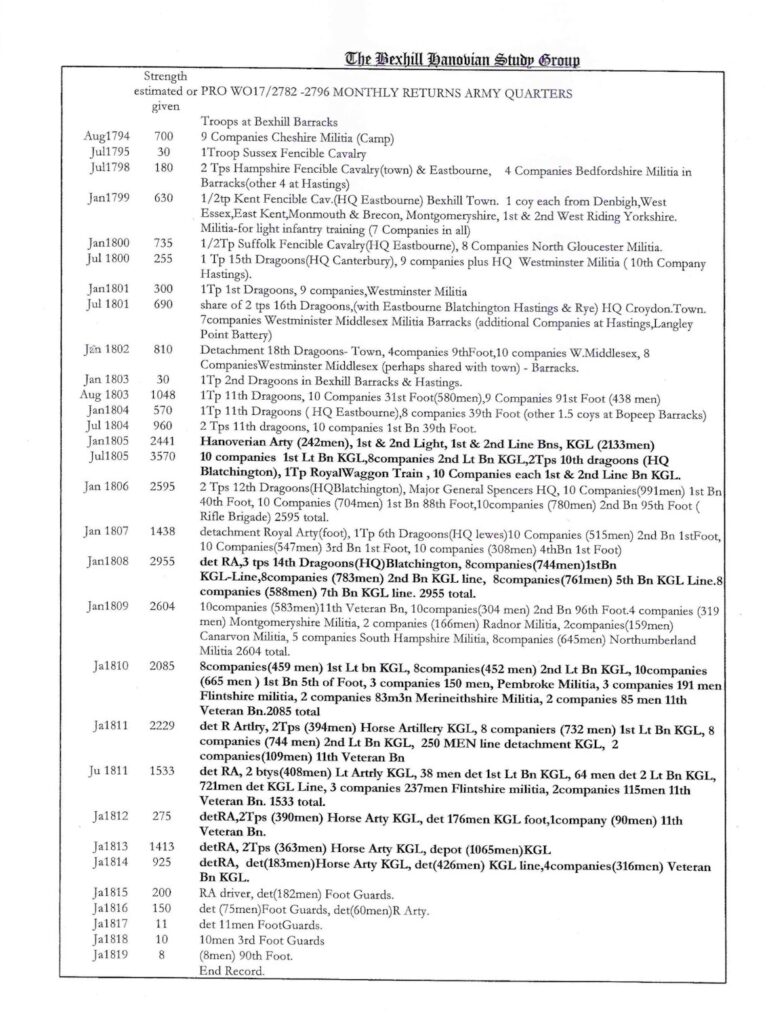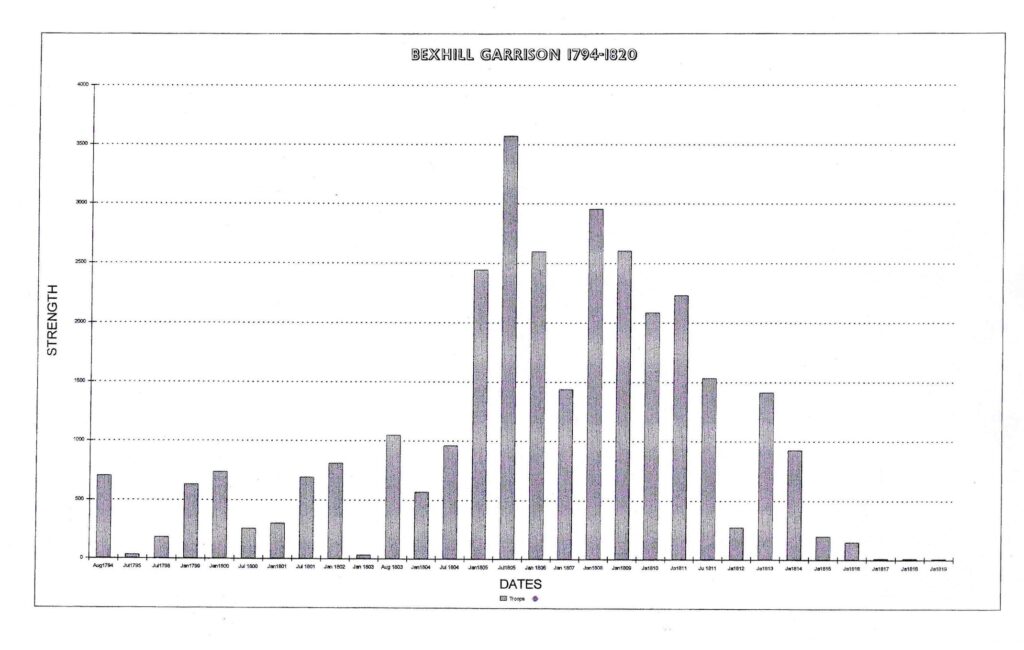Men of the King’s German Legion first appeared in Bexhill in the autumn of 1804.
There were two Light Battalions (green jackets) and two Line Battalions (red jackets), a total of about 2,000 men. They would have been Hanoverians, speaking German. They were accommodated in huts on the upper slope of Belle Hill, conditions slowly improving.
At the same time, 700 British troops lived in the purpose-built barracks situated nearer The Down.
A third KGL Line battalion was forming, from recruits, and there was a detachment of KGL Artillery of about 240 men, with horses stabled on The Down, to pull the guns.
A fourth Line Battalion was formed before all the KGL units left Bexhill in October 1805. The Artillery had already left in April.
The German presence had lasted for about a year.
For two years, 1806-7, there were no German infantry stationed at the barracks. Only British foot regiments came and went.
In December 1807, the 1st and 2nd Line Battalions KGL returned, to be joined in January 1808 by the 5th and 7th Line Battalions, altogether about 3,000 men. They remained over the winter until April, when, with a KGL Artillery detachment, they all departed.
Almost another year went by until, in March 1809, about 1,300 men of the 1st and 2nd Light Battalions KGL arrived. The majority of them left in July leaving a small representative group.
These Light Battalions returned five months later, in January 1810. They were to stay in Bexhill for more than a year, the majority of them leaving in February 1811. They would return again only briefly in 1814 before marching to Deal for embarkation to the continent, hostilities ended.
During their year in Bexhill, the KGL Light Infantrymen would have become a part of the life of the growing town, mixing with the local population. Mary Ann Pumphrey’s husband was one of them, dying with others during the defence of the farm of La Haye Sainte.
In 1812 and 1813 the KGL were recruiting from other nationalities, including French prisoners of war. They would be trained in Bexhill and posted on to one ofthe KGL Battalions.
Other KGL men in Bexhill in these later years were a growing number of Veterans, older or sick men, unsuitable for active service but engaged in appropriate duties.
Army Life in Bexhill
Life for the King’s German Legion soldiers in Bexhill would be centred on training, acquiring the skills to be used in the theatre of war. The majority were infantrymen of Line or Light Battalions. Some were artillerymen, concerned with manoeuvring and manning the horse drawn guns.
Route marches were an essential element of their life. Inspections would ensure order in their accommodation.
Officers had the responsibility for their horses, ensuring that they were well-fed and in good health. A horse ration for home service was 1 pounds of hay, 10 pounds of oats and 4 pounds of straw per day.
The men had daily rations but there were no army cooks. Groups pooled their rations and formed ‘messes’, catering for breakfast and dinner. Their diet was of bread and beef or pork with peas, and butter or cheese in lesser amounts.
For their leisure time there were four inns in the neighbourhood: the Gun, on the Down, not far from the Artillery stables; The New Inn at Sidley, where they used a bowling alley; The Black Horse, at the entrance to the barracks, later named The Queen’s Head until its demolition for King Offa Way; and the old Bell Inn, part of the original village of Bexhill.
Officers would take time off to socialise with local gentry, or travel further afield to London, where the theatre would be an attraction. In 1812, an acting troop visited Bexhill. Their programme included music played by a military band.
Not many crimes and incidents caused by, or which involved, the King’s German Legion have, actually, been found but these are a few. – though rather vaguely!
It seems, from the many newspaper reports at the time, that the Germans greatly impressed the English with their manners and behaviour. Young ladies, especially, were very impressed with the soldiers’ uniforms, probably, also, with their accent, and, almost definitely, their dancing prowess at such modern dances as the Waltz.
Incidents & Crime
Pirates attack Bexhill
The Times, Thursday, October 5, 1809
This day week, about two o’clock, a large lugger privateer chased a merchant brig close on shore at Bexhill, upon which the garrison turned out immediately to protect the brig, with their musketry, having no cannon. Aware of the circumstance, the privateer fired a broadside, but fortunately none of the soldiers were killed or wounded, notwithstanding one of the round shot, a 12-pounder, came through the Barrack Square and entered the Hospital, which was very much damaged, and one of the patients received a trifling wound from a splinter.
A ship laden with timber from the Eastward, was captured off Dover 29th July by a French privateer, and carried into Calais.
A Duel
From the Kentish Gazette 3-7 May 1806
Lewes, May 3, 1806.
“On Thursday last two lieutenants of a regiment in Bexhill Barracks, in consequence of a dispute at their mess, adjourned to the common, to settle the business in an HONOURABLE way, when the shot of one of them taking effect in the thigh of his adversary, the affair terminated. We are glad to hear the life of the wounded gentleman is not thought to be in danger.”
Murder
The Sussex Weekly Advertiser, September 16, 1805
One day last week, the body of a Hanoverian soldier, was found with his hands and legs tied and a handkerchief stuffed in his mouth on Little Common, near Bexhill, where he had lain eight weeks, and consequently become quite putrid.
The deceased being a sober, steady man, and possessed of some property, which he always carried about him, no doubt is entertained of his having been robbed and murdered by some villains, whom it is to be hoped, Justice will speedily overtake.
Burglary
From the Kentish Gazette 15-19 July 1811
Lewes 15 July 1811
‘On Wednesday last, a Foreign Soldier named Grubesken, attached to the King’s German Legion, was committed to Horsham gaol, charged with having attempted burglariously to enter the shop of Mr. Wedd, Draper and Grocer of Bexhill, on the night preceding Wednesday, with intent to steal…..
Mr. Wedd, in consequence of the number of Burglaries which had been committed during the last four months (No less than 12 houses having been broken into or attempted) had employed persons to sit up and protect his premises, and about midnight, was called up by Edward Jarvis, his assistant, who was on watch, and informed that an attempt was then making to enter his shop; Mr. Wedd, after procuring other assistance, proceeded into the street, when Grubesken, who had forced one of the window shutters, fled, but was overtaken, and knocked down by Mr. Jarvis, and afterwards secured.
The prisoner is a native of Poland, and a deserter from the French Army in Portugal.’



